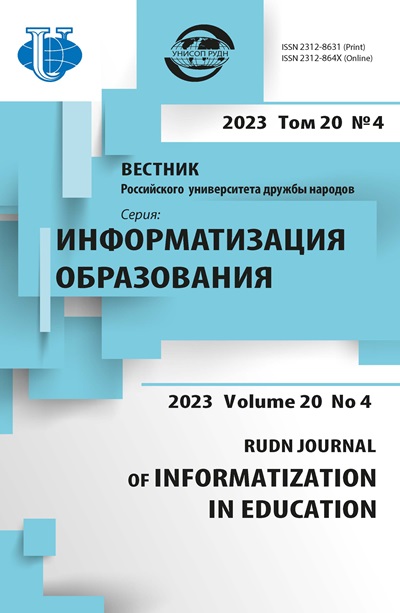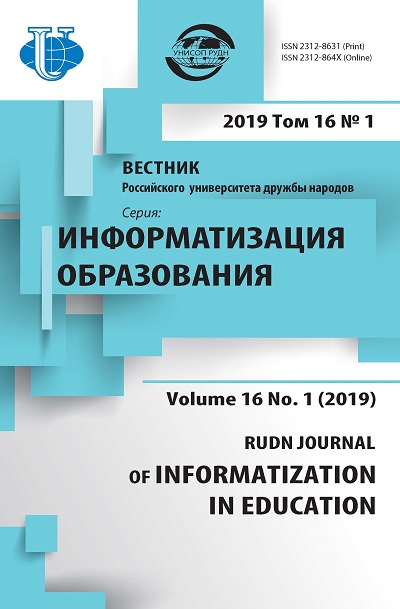The development of scientific outlook of students when teaching inverse problems for differential equations
- Authors: Kornilov V.S.1
-
Affiliations:
- Moscow city pedagogical university
- Issue: Vol 16, No 1 (2019)
- Pages: 46-55
- Section: INNOVATION PEDAGOGICAL TECHNOLOGIES IN EDUCATION
- URL: https://journals.rudn.ru/informatization-education/article/view/20841
- DOI: https://doi.org/10.22363/2312-8631-2019-16-1-46-55
Cite item
Full Text
Abstract
Problem and goal. Modern achievements of the world Science of nature and the world, physical laws and laws should be disclosed at an accessible level to University students. Among the scientific methods of research of physical processes and phenomena, an important place is the method of mathematical modeling, because mathematical models have scientific and cognitive potential and versatility (see, for example, [2-4]). The use of mathematical models of inverse problems for differential equations (IPDE) allows to effectively investigate many processes and phenomena occurring in the air, earth and water environment. It is not surprising that in some Russian universities in the physical and mathematical areas of training are taught IPDE in the form of a choice of courses. The goals and objectives of such teaching are set, as a result of which students would develop creative mathematical abilities, formed fundamental knowledge in the field of physical education, developed a scientific worldview. Methodology. The development of scientific outlook of students of physical and mathematical directions of preparation, as a result of teaching IPDE, ensured the successful will be implemented in practice, such conditions as: 1. the involvement of experts in the field IPDE with teaching experience at the university; 2. development of the content of lectures and practical classes on the basis of modern achievements of the theory of inverse and incorrect problems, taking into account the professional orientation of training students; 3. the implementation of the principles, methods and means of education IPDE; 4. involvement of students in research work in scientific seminars and participation in scientific conferences devoted to IPDE; 5. implementation of methodological approaches that allow students to develop the skills and abilities of independent analysis of applied and humanitarian nature of the results of research of IPDE. Results. In practical classes on the IPDE students acquire the ability and skills to apply effective approaches and mathematical methods of finding solutions to inverse problems, followed by a logical analysis of their solutions. As a result, students gain useful experience in the analysis of new information about the studied physical processes and phenomena, form new scientific knowledge about the world on the basis of which develop a scientific worldview. Conclusion. Developed, in the process of teaching IPDE, the scientific outlook helps students to understand that mathematical models IPDE are relevant to theory, experiment and philosophy - the basic methods of knowledge researchers; to understand the humanitarian value of mathematical models IPDE.
About the authors
Viktor Semenovich Kornilov
Moscow city pedagogical university
Author for correspondence.
Email: vs_kornilov@mail.ru
doctor of pedagogical sciences, candidate of physical and mathematical sciences, full professor, deputy head of the department of informatization of education
29 Sheremetyevskaya St., Moscow, 127521, Russian FederationReferences
- Agranovich Z.S., Marchenko V.A. Obratnaya zadacha teorii rasseyaniya [Inverse problem of scattering theory]. Har’kov: Har’kovskii universitet Publ., 1960. 268 p.
- Amelkin V.V. Differencial’nye uravneniya v prilozheniyah [Differential equations in applications]. M.: Nauka, 1987. 158 p.
- Aramanovich I.G., Levin V.I. Uravneniya matematicheskoj fiziki [Equations of mathematical physics]. M.: Nauka, 1969. 286 p.
- Ashihmin V.N. Vvedenie v matematicheskoe modelirovanie [Introduction to mathematical modeling]: uchebnoe posobie. M.: Logos, 2015. 440 p.
- Belishev M.I., Blagoveshchenskiy A.S. Dinamicheskie obratnye zadachi teorii voln [Dynamic inverse problems of wave theory]. SPb.: SPbGU, 1999. 266 p.
- Bidaibekov E.S., Kornilov V.S., Kamalova G.B. Obuchenie budushhih uchitelej matematiki i informatiki obratnym zadacham dlja differencial’nyh uravnenij [The training of future teachers of mathematics and informatics inverse problems for differential equations]. Vestnik Moskovskogo gorodskogo pedagogicheskogo universiteta. Serija: Informatika i informatizacija obrazovanija [Bulletin of the Moscow City Pedagogical University. Series: Informatics and Informatization of Education]. 2014. No. 3(29). Pp. 57—69.
- Bolibruh A.A. Obratnye zadachi monodromii v analiticheskoj teorii differencial’nyh uravnenij [Inverse problems of monodromy in the analytic theory of differential equations]: lekcii. M.: MCNMO, 2009. 221 p.
- Buhgejm A.L. Vvedenie v teoriju obratnyh zadach [Introduction to the theory of inverse problems]: monografiya. Novosibirsk: Nauka, Sibirskoe otdelenie, 1988. 181 p.
- Vatulyan A.O., Belyak O.A., Sukhov D.Yu., Yavruyan O.V. Obratnye i nekorrektnye zadachi [Inverse and incorrect tasks]: ucheb. posobie. Rostov-na-Donu: Juzhnyi federal’nyi universitet, 2011. 232 p.
- Veselova E.A. Formirovanie nauchnogo mirovozzreniya studentov v obrazovatel’no-vospitatel’nom processe vysshej shkoly [Formation of scientific outlook of students in the educational process of higher education]: dis.. kand. ped. nauk. Nizhnij Novgorod, 2008. 255 p.
- Gnedenko B.V. Matematika i zhizn’ [Mathematics and life]. M.: Komkniga, 2006. 125 p.
- Grigoryan M.E. Formirovanie nauchnogo mirovozzreniya studentov sredstvami istorii matematiki v processe obucheniya teorii veroyatnostej [Formation of scientific outlook of students by means of history of mathematics in the process of teaching probability theory]. Sociosfera [Sociosphere]. 2014. No. 3. Pp. 87—89.
- Denisov A.M. Vvedenie v teoriyu obratnyh zadach [Introduction to the theory of inverse problems]: uchebnoe posobie. M.: Moskovskii universitet, 1994. 207 p.
- Ivanova T.A. Gumanitarizaciya matematicheskogo obrazovaniya [Humanitarization of mathematical education]: monografiya. Nizhnij Novgorod: NGPU, 1998. 206 p.
- Kabanikhin S.I. Obratnye i nekorrektnye zadachi [Inverse and incorrect problems]: uchebnoe posobie. Novosibirsk: Siberian scientific publishing house, 2009. 458 p.
- Kasyan A.A. Kontekst obrazovaniya: nauka i mirovozzrenie [Context of education: science and world outlook]: monografiya. Nizhnij Novgorod: NGPU, 1996. 184 p.
- Kolmogorov A.N. Matematika — nauka i professiya [Mathematics is a science and a profession]. M.: Nauka, 1988. 288 p.
- Kornilov V.S. O mezhdisciplinarnom haraktere issledovanij prichinno-sledstvennyh obratnyh zadach [About cross-disciplinary character of researches of cause and effect inverse problems]. Vestnik Moskovskogo gorodskogo pedagogicheskogo universiteta. Serija: Informatika i informatizacija obrazovanija [Bulletin of the Moscow City Pedagogical University. Series: Informatics and Informatization of Education]. 2004. No. 1(2). Pp. 80—83.
- Kornilov V.S. Obratnye zadachi v soderzhanii obucheniya prikladnoj matematike [Inverse problems in the content of teaching applied mathematics]. Vestnik Rossijskogo universiteta druzhby narodov. Serija: Informatizacija obrazovanija [Bulletin of Peoples’ Friendship University of Russia. Series: Education Informatization]. 2014. No. 2. Pp. 109—118.
- Kornilov V.S. Realizacija nauchno-obrazovatel’nogo potenciala obuchenija studentov vuzov obratnym zadacham dlja differencial’nyh uravnenij [Realization of scientific and educational potential of training of students of higher education institutions in the inverse problems for the differential equations]. Kazanskij pedagogicheskij zhurnal [Kazan pedagogical journal]. 2016. No. 6. Pp. 55—59.
- Kornilov V.S. Teorija i metodika obuchenija obratnym zadacham dlja differencial’nyh uravnenij [Theory and technique of training to the inverse problems for differential equations]: monografija. M.: OntoPrint Publ., 2017. 500 p.
- Kornilov V.S. Formirovanie fundamental’nyh znanij po matematicheskomu modelirovaniyu pri obuchenii obratnym zadacham dlya differencial’nyh uravnenij [Formation of the fundamental knowledge on mathematical modeling in teaching inverse problems for differential equations]. Vestnik Moskovskogo gorodskogo pedagogicheskogo universiteta. Serija: Informatika i informatizacija obrazovanija [Bulletin of the Moscow City Pedagogical University. Series: Informatics and Informatization of Education]. 2017. No. 1(39). Pp. 92—99.
- Kornilov V.S. Formirovanie u studentov mezhdisciplinarnyh nauchnyh znanij pri obuchenii obratnym zadacham dlya differencial’nyh uravnenij [Formation of students’ interdisciplinary scientific knowledge in teaching inverse problems for differential equations]. Vestnik Kazahskogo nacional’nogo pedagogicheskogo universiteta imeni Abaya. Seriya: Fiziko-matematicheskie nauki [Bulletin of Kazakh National Pedagogical University named after Abay. Series: Physics and mathematical Sciences]. 2018. No. 4(64). Pp. 46—50.
- Kuvakin V.A. Nauchnoe mirovozzrenie i gumanizm [Scientific worldview and human]. Zdravyj smysl [Common sense]. 2007. No. 2. Pp. 31—36.
- Lavrentiev M.M. O zadache Koshi dlya uravneniya Laplasa [On the Cauchy problem for the Laplace equation]. Izvestiya AN SSSR [Proceedings of the USSR Academy of Sciences]. 1956. Vol. 20. No. 6. Pp. 819—842.
- Levchenko I.V., Kornilov V.S., Belikov V.V. Rol’ informatiki v podgotovke specialistov po prikladnoj matematike [The role of informatics in the training of specialists in applied mathematics]. Vestnik Moskovskogo gorodskogo pedagogicheskogo universiteta. Serija: Informatika i informatizacija obrazovanija [Bulletin of the Moscow City Pedagogical University. Series: Informatics and Informatization of Education]. 2009. No. 2(18). Pp. 108—112.
















